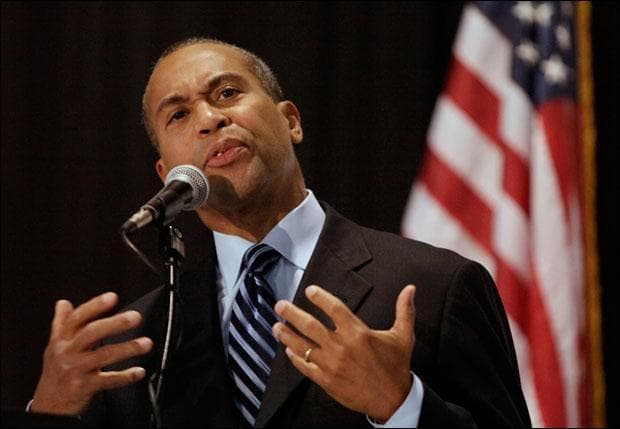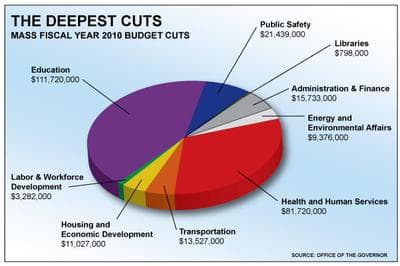Advertisement
Patrick: Cuts Force Hard Questions About State Services
Resume
The big hole in the state budget comes about for one simple reason.
"Tax receipts have lagged, and the state operating budget is under serious stress, you know that," Gov. Deval Patrick told the Worcester Chamber of Commerce on Thursday.
In general, the governor is not cutting aid to cities and towns.
"Local communities are the front line of both our economic and our social life," Patrick said, "and they are struggling as it is, especially as lottery performance fails consistently to meet projections."
The lottery is managed by Treasurer Timothy Cahill, who has left the Democratic party to run against Patrick for the governor's job.
Local communities will still feel the pinch of these budget cuts. The biggest cuts will be to the transportation of students in regional school districts. Patrick said the most painful cuts, to him, are those in public safety. He is reducing state funding for police officers who have college degrees. He's also asking the Legislature to let cities and towns get out of contracts that require higher salaries for officers who pursue higher education.

"This is very bad news for law enforcement, for public safety, and for those people that we serve, " said New Bedford's police chief, Ron Teachman. He said the cuts leave officers with as much as a 25 percent reduction in pay.
"That's a huge and sudden loss of income," Teachman said. "Certainly, it's not as dramatic as losing your job, but it's a tough hit for us to take."
The governor is also cutting a third of the funding to prevent gang violence. Teachman said that without that money, New Bedford won't be able to continue the work.
"Police do the suppression, and we'll still be here, but the work will be a lot harder because we'll be doing all the back-end work on suppression and re-entry efforts after they go to prison," Teachman said. "We're trying to prevent crime, and not just make arrests and respond to it after it happens."
At the same time, the governor is being criticized for using federal stimulus money and the state's rainy day fund to offset part of the budget deficit. Michael Widmer, of the Massachusetts Taxpayers' Foundation, warned the state is running through the money very quickly.
"And this just delays the day of reckoning and means more pain later," Widmer said.
He got no argument from Patrick.
"As hard as this was," Patrick said, "we have a whole other order of magnitude to deal with in the fiscal year 2011 budget that we have to submit in January, because the federal stimulus money, some of the rainy day money will not be available to us at the same levels next year."
Patrick added that the crisis also offers an opportunity to ask hard questions about whether some worthy programs are actually central to the role of government.
This program aired on October 30, 2009.
